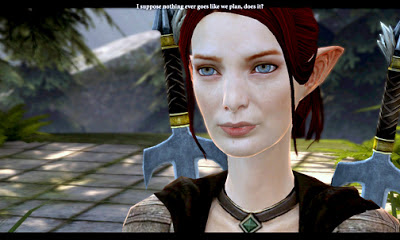 |
| "I suppose nothing ever goes as we plan, does it" (Pretty much the story of this chick's life.) |
So I just finished playing the Mark of the Assassin DLC and was very pleasantly surprised. The dialogue was witty, the conversations weren't awkward (much), there was actual playier choice involved, and what was said in dialogue actually kinda mattered. Like the core game, MotA made a few shoutouts/references to Dragon Age: Origins, but unlike some (not all!) of the ones in DA2 they didn't feel forced. Sometimes the reference, as seen with Bann Teagan's cameo, didn't even mention the previous game. Those were perhaps my favorite since they knew players would make the connection all on thier own. There were also a number of major fights that actually involved some level of strategy to win. The final fight was a challenge, but it wasn't an unfair one. A lot of fighting was involved with this DLC, but I never felt like the devs were throwing enemies in there just for the heck of it. In fact, for the most part, there were not a lot of spawning enemies. If I saw fifteen bad guys, then I was fighting fifteen bad guys. I cannot express how much I hate the spawning enemies in Dragon Age 2. I really, really hate it. When you have wave after wave of enemies coming after you, sometimes with the "big" character (chief, commander, etc) not showing up until the second or third wave, the amount of strategy the player can actually employ is limited. When, however, you know that all the baddies onscreen are all you are going to see, then the player can actually plan out which moves they will make. Who will they take out first? Who will the PC focus on? Which group of characters will best utilize each companion's skill set? I really miss that part of Dragon Age: Origins. In DA:O, the only spawning of bad guys you saw happened during major boss fights. At that point, waves of them were scripted to appear in between boss attacks. That kind of "spawning" is pretty much par for the course, and once a wave happened, that was all you had until after the Boss attacked again.
I know I've been hating an awful lot on Dragon Age 2 even though I said that i was going to give it a fair go. I'm still trying to give it a fair play, but it's so hard when things like spawning enemies annoy me to no end. Mark of the Assassin is proof that the DA2 devs could have done so much better. In MotA there were new environments and interesting things to see. There were only one or two non-doors, but that is no more than you would expect in any other game. The doors weren't blocked to make a reused map "new", they were blocked b/c they were just dummy doors. Nothing to see there. Combat was interesting, and I actually enjoyed it rather than dreaded it. The story was perhaps a bit contrived, but not enough to warrant censure, and certainly no more than the genre normally allows. The main puzzle made you think, but was not impossible. I normally could do with out them, but this were a nice change of pace. I will mention that there is a very poorly done stealth sequence in-game, but players have an option to forego stealth in lieu of all out bloodshed. I did give the stealth portion an honest to God effort, but it was more headache than it was worth.
Perhaps the best thing though, is that the companions finally ceased all their moaning and groaning. With a rescue-from-prison sequence, we also witnessed a brief return of the companion buddy comedy from DA:O's Fort Drakon. (In fact, come to think of it, about 50% of this DLC reminded me of the Fort Drakon story arc). Fenris stopped whining about mages and how hard life is. Anders almost stopped moaning about the Chantry and the Templars. Gloriously, the one time he did make a snide comment, Tallis called him out on it. Even better, however, was the fact that Anders and Fenris actually sorta kinda got along! There was one moment where Anders actually deferred to Fenris for an answer about [some plot centric thing], and disregarded Tallis (even though she knew more about it) because he didn't trust her.
I also really liked the way this DLC used the Varric storytelling ploy to bookend its narrative. Despite the fact that he is the one telling DA2's tale, the game very rarely reminds us of this fact. In fact, it reminds us of it so little that the first time I played DA2 I was a little shocked to see Varric pop up in between game chapters. I do have to hand it to the devs thought. When Dragon Age 2 does acknowledge Varric's storytelling role, they do so to great effect.
So all in all, I really liked Mark of the Assassin. I won't say it's the best thing I've ever played, but it is a far cry better than anything else I've seen in Dragon Age 2 so far. Despite my general hate for DLC, this one was actually well worth the money I paid. MotA shows that the DA2 team was capable of so much more than what they presented in the core title. I just wish they'd taken advantage of that fact before hand, and not waited until a DLC release to show their hand.
Find some Mark of the Assassin comment-as-I-go tweets after the jump.






